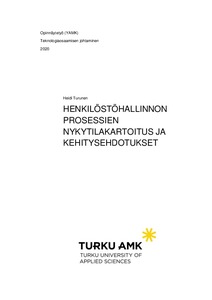Henkilöstöhallinnon prosessien nykytilakartoitus ja kehitysehdotukset
Turunen, Heidi (2020)
Turunen, Heidi
2020
All rights reserved. This publication is copyrighted. You may download, display and print it for Your own personal use. Commercial use is prohibited.
Julkaisun pysyvä osoite on
https://urn.fi/URN:NBN:fi:amk-2020060717521
https://urn.fi/URN:NBN:fi:amk-2020060717521
Tiivistelmä
Tämän tutkimuksen tavoitteena oli tehdä nykytilakartoitus noin 100 henkilöä työllistävässä PK-yrityksessä henkilöstöjohtamisen prosesseista. Nykytilakartoituksen avulla tarkasteltiin nykyisiä henkilöstöjohtamisen prosesseja, käytäntöjä sekä tapoja henkilöstön ja esimiesten näkökulmasta. Kartoituksen avulla pyrittiin etsimään kehitysehdotuksia henkilöstöjohtamisen osa-alueiden kehittämiseen.
Tutkimuksen teoriapohja koostuu henkilöstöjohtamisen teoreettisista malleista sekä henkilöstöjohtamisen alaa koskevista tutkimuksista. Tutkimuksen empiirinen aineisto koostuu esimiesten teemahaastatteluista ja henkilöstön lomakekyselystä. Aineistona käytettiin myös yrityksen sisäistä dokumentaatiota, kuten laatukäsikirjaa sekä edellisten vuosien henkilöstökyselyjä.
Nykytilakartoituksen avulla muodostettiin näkemys yrityksen henkilöstöjohtamisen prosessien ja roolien nykytilasta. Haastatteluissa ja kyselyissä esiin tulleisiin ongelmakohtiin pyrittiin löytämään kehitysehdotuksia peilaten henkilöstöjohtamisen teoriaan sekä tutkimuksiin.
Tämän tutkimuksen perusteella voidaan vahvistaa aiempien henkilöstökyselyjen tuloksia ja todeta henkilöstöjohtamisen prosessien kaipaavan runsaasti kehittämistä monilla osa-alueilla. Henkilöstömäärän kasvaessa yrityksen tulisi yhdenmukaistaa käytännöt ja tavat sekä luoda selkeämmät henkilöstöjohtamisen prosessit. Tutkimuksessa löydettiin useita kehitysehdotuksia prosessien parantamiseksi muun muassa johtamiseen, palkitsemiseen ja motivaation parantamiseen. Lopuksi esitetään useita ehdotuksia yrityksen henkilöstöjohtamisen käytäntöjen ja prosessien kehittämiseen.
Tulevaisuudessa olisi suositeltavaa tehdä tarkentavia tutkimuksia liittyen henkilöstöjohtamisen osa-alueiden sekä käytäntöjen kehittämiseen. The aim of the present study is to evaluate the Human Resource Management (HRM) processes of an SME (Small and medium-sized enterprise) employing about 100 people. The evaluation focuses on the current HRM processes and practices from the perspective of staff and supervisors with the goal of identifying opportunities to improve HRM processes and practises.
The theoretical framework of the study consists of the theoretical HRM models and research on HRM practices.
The empirical data were collected both through theme interviews with the company's supervisors and a quantitative survey conducted among the staff. Additionally, the evaluation includes the company’s internal documentation such as the Quality Handbook and previous staff surveys.
The data evaluation provided insights into the current state of the company's HRM processes and roles. The objective was to identify opportunities for development in the problematic areas. These opportunities were discovered through comparing the present state with the HRM theories and models.
The study confirms the results of the previous staff surveys that suggested that the company’s HRM processes need a lot of development in many areas. As the number of employees grows, the company needs to harmonize practices and document HR processes. The study identified several development opportunities for improving processes in leadership, incentives, and in improving motivation. The study introduces several concrete suggestions for improvement opportunities regarding the processes and practices in the company.
In the future it is recommended to conduct more detailed studies on the sub-areas of HRM processes and practices to continue the development work.
Tutkimuksen teoriapohja koostuu henkilöstöjohtamisen teoreettisista malleista sekä henkilöstöjohtamisen alaa koskevista tutkimuksista. Tutkimuksen empiirinen aineisto koostuu esimiesten teemahaastatteluista ja henkilöstön lomakekyselystä. Aineistona käytettiin myös yrityksen sisäistä dokumentaatiota, kuten laatukäsikirjaa sekä edellisten vuosien henkilöstökyselyjä.
Nykytilakartoituksen avulla muodostettiin näkemys yrityksen henkilöstöjohtamisen prosessien ja roolien nykytilasta. Haastatteluissa ja kyselyissä esiin tulleisiin ongelmakohtiin pyrittiin löytämään kehitysehdotuksia peilaten henkilöstöjohtamisen teoriaan sekä tutkimuksiin.
Tämän tutkimuksen perusteella voidaan vahvistaa aiempien henkilöstökyselyjen tuloksia ja todeta henkilöstöjohtamisen prosessien kaipaavan runsaasti kehittämistä monilla osa-alueilla. Henkilöstömäärän kasvaessa yrityksen tulisi yhdenmukaistaa käytännöt ja tavat sekä luoda selkeämmät henkilöstöjohtamisen prosessit. Tutkimuksessa löydettiin useita kehitysehdotuksia prosessien parantamiseksi muun muassa johtamiseen, palkitsemiseen ja motivaation parantamiseen. Lopuksi esitetään useita ehdotuksia yrityksen henkilöstöjohtamisen käytäntöjen ja prosessien kehittämiseen.
Tulevaisuudessa olisi suositeltavaa tehdä tarkentavia tutkimuksia liittyen henkilöstöjohtamisen osa-alueiden sekä käytäntöjen kehittämiseen.
The theoretical framework of the study consists of the theoretical HRM models and research on HRM practices.
The empirical data were collected both through theme interviews with the company's supervisors and a quantitative survey conducted among the staff. Additionally, the evaluation includes the company’s internal documentation such as the Quality Handbook and previous staff surveys.
The data evaluation provided insights into the current state of the company's HRM processes and roles. The objective was to identify opportunities for development in the problematic areas. These opportunities were discovered through comparing the present state with the HRM theories and models.
The study confirms the results of the previous staff surveys that suggested that the company’s HRM processes need a lot of development in many areas. As the number of employees grows, the company needs to harmonize practices and document HR processes. The study identified several development opportunities for improving processes in leadership, incentives, and in improving motivation. The study introduces several concrete suggestions for improvement opportunities regarding the processes and practices in the company.
In the future it is recommended to conduct more detailed studies on the sub-areas of HRM processes and practices to continue the development work.
